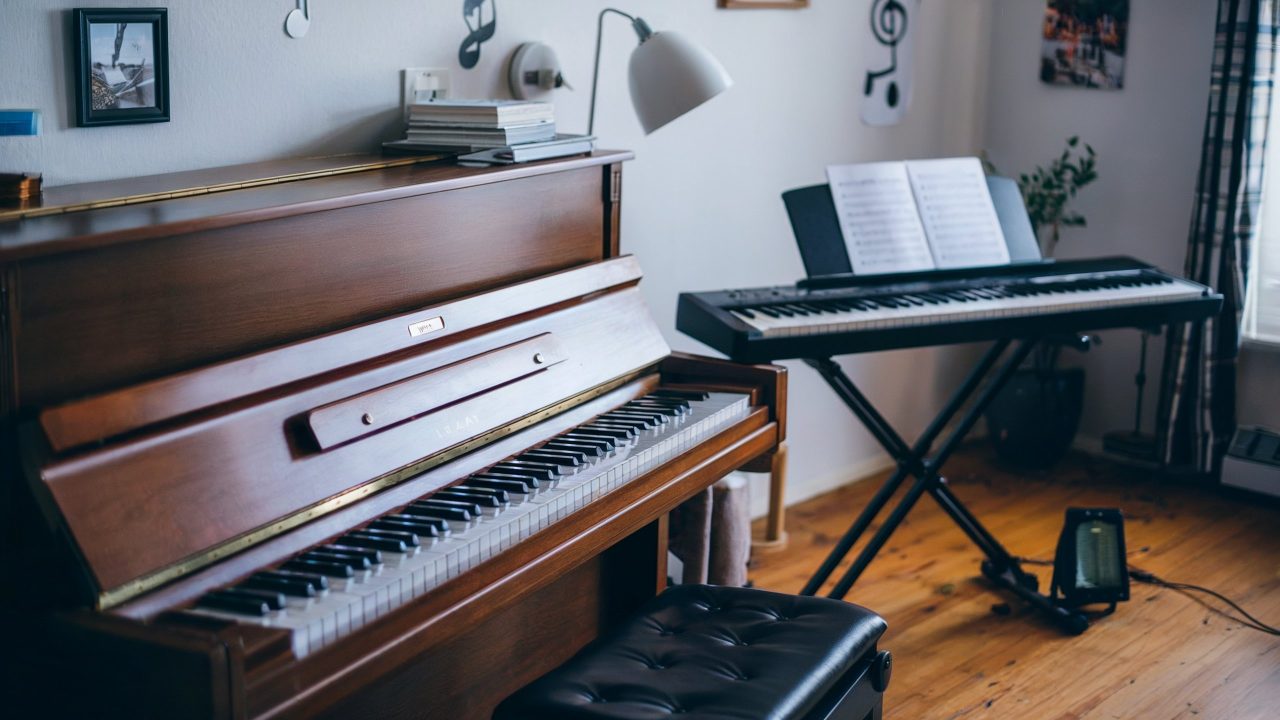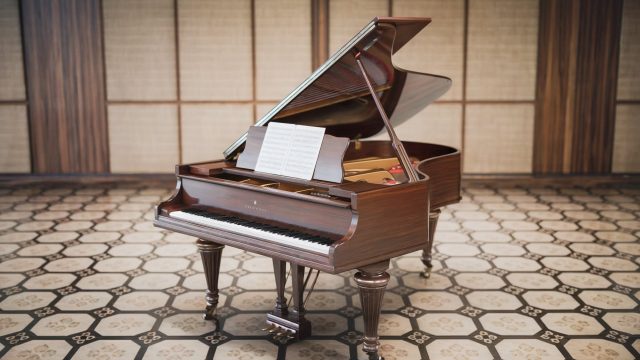Piano Lessons and What Pianos and Keyboards Can Do for Music The piano is one of the most iconic and versatile instruments in the world of music. Whether you’re captivated by the rich sound of a grand piano or the endless possibilities of modern keyboards, learning to play the piano opens up a world of...
Piano and Keyboards

Piano Lessons and What Pianos and Keyboards Can Do for Music
The piano is one of the most iconic and versatile instruments in the world of music. Whether you’re captivated by the rich sound of a grand piano or the endless possibilities of modern keyboards, learning to play the piano opens up a world of musical expression. From classical masterpieces to jazz improvisation, pop melodies, and even electronic music production, the piano and its electronic counterpart, the keyboard, are central to countless genres.
In this post, we’ll explore the benefits of taking piano lessons, the unique qualities of pianos and keyboards, and how these instruments contribute to music in profound and versatile ways.
Why Take Piano Lessons?
Piano lessons offer numerous benefits that go beyond simply learning to play music. Whether you’re a beginner or someone returning to the instrument after a break, studying the piano can be a deeply rewarding experience. Here are some key reasons to take piano lessons:
1. Builds a Strong Musical Foundation
The piano is often considered one of the best instruments for learning music theory and developing a solid musical foundation. The layout of the piano keyboard makes it easy to visualize scales, chords, and intervals, which are the building blocks of music. This foundational knowledge can make learning other instruments easier in the future.
2. Enhances Cognitive Skills
Learning to play the piano engages multiple areas of the brain simultaneously, leading to improved memory, focus, and problem-solving abilities. Research has shown that piano lessons can enhance cognitive development, particularly in young learners, by improving hand-eye coordination, concentration, and multitasking skills.
3. Increases Emotional Expression
The piano allows for a wide range of dynamics and tonal expression, making it an excellent instrument for conveying emotions through music. Whether you’re playing a soft, lyrical melody or a powerful, dramatic piece, the piano offers endless possibilities for expressing your emotions and creativity.
4. Improves Discipline and Patience
Mastering the piano requires regular practice, discipline, and patience. Learning to play complex pieces or refining technique takes time, and piano lessons teach valuable life skills like perseverance and time management. These qualities can benefit you in all areas of life, from academics to your career.
5. Provides Performance Opportunities
Piano lessons often lead to opportunities to perform in recitals, competitions, or even informal gatherings with friends and family. These performance experiences help build confidence, stage presence, and the ability to share your music with others.
What Pianos and Keyboards Can Do for Music
Pianos and keyboards play a crucial role in many different genres and styles of music. Their versatility, range, and ability to produce both melody and harmony make them indispensable tools for musicians and composers alike. Here’s a closer look at what pianos and keyboards bring to the world of music:
1. Harmonic Versatility
The piano’s ability to play multiple notes at once allows it to create rich harmonies and complex chord progressions. This makes it an ideal instrument for solo performances, accompaniment, and ensemble playing. Whether you’re playing a simple chord progression or a complex fugue, the piano can handle it all.
- Classical Music: In classical music, the piano is often used as both a solo instrument and as part of an ensemble. Its wide range of notes allows composers to create intricate, layered compositions that are both technically challenging and emotionally powerful.
- Pop and Rock: In pop and rock music, the piano and keyboard are often used to provide harmonic support, driving the chords and melody of a song. Many iconic pop and rock songs feature memorable piano riffs and chord progressions that define the sound of the track.
2. Melodic Power
Pianos and keyboards are capable of playing both melody and harmony, making them incredibly powerful instruments for solo performances. Pianists can play intricate melodies with one hand while accompanying themselves with harmonies or bass lines with the other. This makes the piano one of the most self-sufficient instruments, perfect for solo performances and compositions.
- Jazz and Blues: In jazz and blues, the piano is often used for improvisation, creating spontaneous melodies over harmonic structures. The piano’s ability to play both melody and harmony simultaneously makes it a favorite among jazz musicians for solo performances and group settings.
- Singer-Songwriters: Many singer-songwriters use the piano to accompany their vocals, allowing them to perform complex arrangements without the need for additional musicians. The piano’s wide range and versatility make it an ideal instrument for composing and performing original songs.
3. Rhythmic Drive
Pianos and keyboards can also serve as rhythmic instruments, providing driving rhythms that propel the music forward. In genres like pop, rock, and electronic music, keyboards are often used to create rhythmic patterns and textures that form the backbone of a song.
- Electronic Music: In electronic music, synthesizers and digital keyboards are used to create rhythmic loops, bass lines, and percussive elements. These instruments are essential for producing the beats and grooves that define genres like EDM, hip-hop, and house music.
- Accompaniment: In many musical settings, the piano serves as the rhythmic foundation for an ensemble, providing steady chord progressions and rhythmic patterns that support the lead instruments or vocals.
4. Sound Design and Innovation
Modern keyboards and synthesizers offer a vast array of sounds and effects that go beyond the traditional piano. With the ability to mimic other instruments, create electronic sounds, and manipulate audio in real-time, keyboards have become essential tools for composers, producers, and sound designers.
- Film and TV Scoring: Keyboards and synthesizers are often used in film and TV scoring to create atmospheric soundscapes, dramatic effects, and emotional cues. Their versatility allows composers to craft unique soundtracks that enhance the mood and tone of a scene.
- Sound Design: In sound design, keyboards and synthesizers are used to create custom sounds and effects for video games, theater productions, and multimedia projects. From futuristic sci-fi sounds to vintage analog tones, modern keyboards offer endless possibilities for sonic experimentation.
5. Accompaniment and Collaboration
Pianos and keyboards are frequently used to accompany other musicians, making them invaluable in collaborative settings. Whether you’re accompanying a vocalist, a violinist, or a full band, the piano provides a solid harmonic and rhythmic foundation that supports and enhances the performance of others.
- Choirs and Ensembles: Pianos are commonly used to accompany choirs and ensembles, providing the harmonic structure and supporting the vocal or instrumental lines. This makes the piano a key player in both classical and contemporary ensemble settings.
- Bands and Orchestras: In bands and orchestras, keyboards are often used to fill out the sound, adding layers of texture and harmony that enhance the overall performance. Keyboard players can switch between different sounds and roles, making them versatile members of any ensemble.
Choosing the Right Piano or Keyboard for You
When starting piano lessons, one of the first decisions you’ll need to make is whether to invest in an acoustic piano or a digital keyboard. Each option has its own benefits, and the right choice depends on your goals, budget, and living situation.
Acoustic Pianos
Acoustic pianos, including upright and grand pianos, offer unparalleled sound quality and touch sensitivity. The mechanical action of the keys and hammers provides a tactile playing experience that is difficult to replicate with digital instruments. However, acoustic pianos are larger, more expensive, and require regular maintenance, such as tuning.
- Best for: Serious pianists, classical musicians, and those who want the authentic experience of playing a traditional piano.
Digital Keyboards
Digital keyboards offer a more affordable and portable option for beginners and experienced players alike. Modern digital keyboards often include weighted keys to simulate the feel of an acoustic piano, along with a variety of built-in sounds and features. Many digital keyboards also have headphone jacks, making them ideal for practicing in shared living spaces without disturbing others.
- Best for: Beginners, casual players, and those looking for portability and flexibility in their instrument.
Synthesizers and Workstations
For musicians interested in electronic music, sound design, or music production, synthesizers and workstations provide advanced features for creating and manipulating sounds. These instruments offer a wide range of tones, effects, and recording capabilities, making them powerful tools for both live performances and studio work.
- Best for: Producers, electronic musicians, and composers looking for a versatile instrument for creating a wide range of sounds.
The Power of Pianos and Keyboards
Whether you’re drawn to the classic elegance of an acoustic piano or the modern versatility of a digital keyboard, learning to play the piano is a journey that offers countless rewards. From building a strong musical foundation to exploring creative expression, the piano and keyboard are instruments that can open doors to a lifetime of musical enjoyment.
At Musicogroove, we offer personalized piano and keyboard lessons for students of all ages and skill levels. Our experienced instructors are here to guide you every step of the way, helping you develop your skills and discover the joy of making music. Ready to start your piano journey? Contact us today to schedule your first lesson and explore the world of pianos and keyboards!

